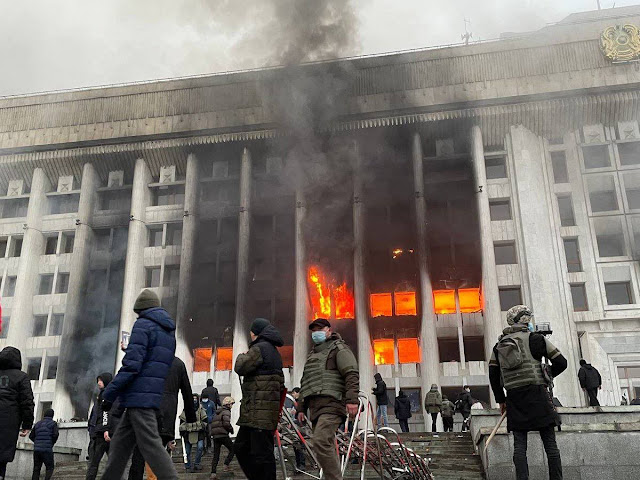Kazakh President, Qasym-Zhomart Toqaev Vows 'Tough' Response as Anti-Government Protests Intensify
pada tanggal
Thursday, January 06, 2022
ALMATY, LELEMUKU.COM - President Qasym-Zhomart Toqaev says he intends to “act as tough as possible" as protesters and security forces clashed in several of Kazakh main cities amid intensifying anti-government demonstrations in the Central Asian country.
"As president, I am obliged to protect the safety and peace of our citizens, to worry about the integrity of Kazakhstan," he said on television on January 5, after angry Kazakhs stormed official buildings in several cities and mobs chased police and soldiers through streets as their frustration with a steep rise in energy prices, along with discontent over issues such as corruption, unemployment, and low wages, boiled over.
In Kazakhstan's largest city, Almaty, hundreds of protesters, some of whom were armed with rubber truncheons, sticks, and shields, stormed the mayor's office on January 5 amid volleys of tear gas, stun grenades, and rubber bullets from police, with reports of a fire breaking out in the building.
Protesters, described by the Almaty police chief as "extremists and radicals," also attempted to break into the presidential residence in the southeastern city, according to news reports, while smoke also streamed out of the ruling Nur Otan party's headquarters.
Communications monitors reported a "national-scale" Internet blackout, while RFE/RL journalists in the country said both Internet and telephone services had deteriorated markedly.
Earlier on January 5, Toqaev dismissed the government and declared a state of emergency in parts of Kazakhstan — including Almaty and the capital, Nur-Sultan — in a bid to head off the wave of protests, which erupted in the western region of Mangystau three days ago over a sudden hike in prices for liquefied petroleum gas (LPG), a popular fuel used in vehicles in the oil-rich country.
The demonstrations then spread across Kazakhstan.
Violence also was reported on January 5 in the northern city of Aqtobe, where police fired tear gas at protesters who tried to enter the regional government building by force.
An RFE/RL correspondent at the scene saw several people with leg injuries.
Protests also continued in other cities and towns, including Aqtau, Zhanaozen, and Oral, where dozens of people reportedly were detained.
Limits appeared to have been imposed on the Internet to limit the ability of demonstrators to mobilize, with web monitoring group NetBlocks reporting a nationwide “blackout.”
Messenger apps Telegram, Signal, and WhatsApp were all said to be unavailable in Kazakhstan, while the website of RFE/RL’s Kazakh Service and those of independent media that reported on the protests also appeared to be blocked.
According to the Interior Ministry, more than 200 people were detained during a previous night of unrest in Almaty and elsewhere, but observers say that number appears to be underestimated. The ministry also said that at least 95 officers have been injured in the clashes.
A decree order published on the presidential website on the morning of January 5 said Toqaev had accepted the resignation of the cabinet headed by Prime Minister Asqar Mamin, in line with the constitution.
First Deputy Prime Minister Alikhan Smailov was appointed as interim prime minister, and current members of the government will continue their duties until a new cabinet is formed, according to the order.
Toqaev imposed states of emergency in the Almaty and Mangystau regions, as well as Nur-Sultan, through January 19 after protests gathered steam. An overnight curfew will be in place there, with restrictions on movement in and out of the cities falling under the decrees.
Before its resignation, the government announced it was restoring the price cap of 50 tenge ($0.11) per liter, or less than half the market price, in Mangystau.
Demonstrators in Aqtau and Zhanaozen argued that the removal of some officials wouldn't bring lasting results, and called for the dissolution of parliament, where no genuine opposition political forces are represented, and new limits to presidential powers, among other things.
Zhanaozen was the scene of a 2011 police crackdown against oil workers protesting over pay and working conditions that claimed the lives of at least 16 of them.
In addition to replacing the prime minister, Toqaev appointed a new first deputy chairman of the National Security Committee (KNB) to replace Samat Abish, a nephew of powerful former President Nursultan Nazarbaev.
Nazarbaev, 81, ruled the country with an iron fist from its independence in 1991 until 2019, when he abruptly resigned as president and picked Toqaev as his successor.
He continues to control social, economic, and political spheres, however, by leading the influential Security Council and enjoying limitless powers as elbasy — the leader of the nation.
Meanwhile, the country’s human rights record has seen little improvement, with peaceful protesters and supporters of banned opposition movements still being detained, fined, and prosecuted.
Kazakh police on January 4 detained RFE/RL journalists who were covering the protests.
Darkhan Umirbekov, an editor with RFE/RL's Kazakh Service, was detained at a demonstration in the capital, Nur-Sultan, just hours after officers briefly held Kasym Amanzhol, the acting Almaty bureau chief of RFE/RL’s Kazakh Service, known locally as Azattyk, as he filmed the third consecutive day of protests.
Umirbekov was released after being interrogated by police for four and a half hours.
RFE/RL President Jamie Fly slammed authorities for detaining journalists who were providing an important public service by covering the demonstrations.
"It is outrageous that reporters would be arrested for just doing their jobs," he said.(RFE/RL|VOA)


